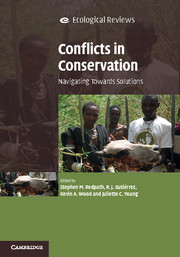Book contents
- Frontmatter
- Dedication
- Contents
- List of contributors
- Foreword by Georgina Mace
- Acknowledgements
- Part I Introduction to conservation and conflict
- PART II Contrasting disciplinary approaches to the study of conflict in conservation
- 3 The value of ecological information in conservation conflict
- 4 Environmental history and conservation conflicts
- 5 The political ecology of conservation conflicts
- 6 Understanding conservation conflicts: an economic perspective
- 7 Anthropological approaches to conservation conflicts
- 8 Law and conservation conflicts
- 9 The relevance of psychology to conservation conflicts
- 10 Conservation conflicts: ethical issues
- 11 A view from sociology: environmental movement mobilisation over old-growth temperate rainforests in British Columbia
- 12 Peace research and conservation conflicts
- 13 Linking conflict and global biodiversity conservation policies
- Part III Approaches to managing conflicts
- Index
- Plate Section
- References
9 - The relevance of psychology to conservation conflicts
from PART II - Contrasting disciplinary approaches to the study of conflict in conservation
Published online by Cambridge University Press: 05 May 2015
- Frontmatter
- Dedication
- Contents
- List of contributors
- Foreword by Georgina Mace
- Acknowledgements
- Part I Introduction to conservation and conflict
- PART II Contrasting disciplinary approaches to the study of conflict in conservation
- 3 The value of ecological information in conservation conflict
- 4 Environmental history and conservation conflicts
- 5 The political ecology of conservation conflicts
- 6 Understanding conservation conflicts: an economic perspective
- 7 Anthropological approaches to conservation conflicts
- 8 Law and conservation conflicts
- 9 The relevance of psychology to conservation conflicts
- 10 Conservation conflicts: ethical issues
- 11 A view from sociology: environmental movement mobilisation over old-growth temperate rainforests in British Columbia
- 12 Peace research and conservation conflicts
- 13 Linking conflict and global biodiversity conservation policies
- Part III Approaches to managing conflicts
- Index
- Plate Section
- References
Summary
Psychology is the scientific study of human thought, behaviour and emotion. Accordingly, this makes it applicable to understanding conflicts and their resolution, at all levels from intrapersonal to international.
Research on conservation conflict in the psychological literature began mainly in the 1980s and has been increasing gradually since then. Notwithstanding a substantial psychological literature on conservation, of the papers published between 2003 and 2012, only about 10% of those retrieved via the PsycINFO database using the joint keywords ‘environment’ (i.e. environment, environmental, etc.) and ‘conflict’ were actually about and relevant to conservation conflicts. Furthermore, there has hitherto apparently been no systematic overview of this literature particularly as regards application to conflict resolution (Coleman and Deutsch, 2012; see also: Deutsch, 1998 and Deutsch et al., 2006). I base much of the discussion in this chapter on approximately 270 publications on psychological aspects of conservation conflict published between 2003 and 2012 plus a number from earlier decades in order to give an overview of relevant aspects of psychology-specific fields and their interface with other disciplines and to demonstrate the diversity of approaches and intersections that psychology brings to conservation issues.
An overview of some areas of psychology and its interface with other disciplines
Psychology is a diverse field. Cognitive psychologists, for example, might point to the importance of how a particular situation is perceived and to common biases and heuristics (mental shortcuts) in perception. Developmental specialists might examine lifespan changes, including how people are socialised into their respective, sometimes conflicting, groups. Other specialities are concerned with human motivation, principles of learning and individual differences. Individual differences include not only demographic variables such as age and geographical location but also some potentially conflict-relevant personality dimensions, such as agreeableness, extraversion, conscientiousness and openness to others’ views. A substantial part of contemporary psychology is concerned with neuro-biological underpinnings of the phenomena being studied, but this is not considered here.
- Type
- Chapter
- Information
- Conflicts in ConservationNavigating Towards Solutions, pp. 122 - 136Publisher: Cambridge University PressPrint publication year: 2015
References
- 1
- Cited by

